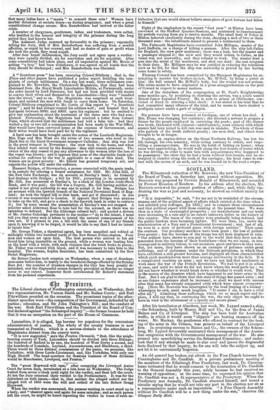tt Vrollintro.
The Liberal electors of Northampton entertained, on Wednesday, their two representatives, Mr. Vernon Smith and Mr. Rallies Currie ; and Earl Fitzwilliam presided on the occasion. The prominent topics of the after- dinner speeches were—the composition of the Government, defended by all parties ; education, and Sir John Pakington's Bill ; and the conduct of the war. Both Earl Fitzwilliam and the President of the Board of Con- trol declared against "the Sebastopol inquiry"—the former because he held that it was an usurpation on the part of the House of Commons.
Lancashire, it is alleged, has become too populous for the convenient administration of justice. The whole of the county business is now transacted at Preston ; which is a serious obstacle to the attendance of Magistrates distant from the country town. "It is now suggested," says the Preston Chronicle, "that, like the neigh- bouring county of York, Lancashire should be divided into three Ridings ; the hundred of Salford to be one, the hundred of West Derby a second, and the hundreds of Lonadale, Leyland, Amoundernesa, and Blackburn, a third. There would be three distinct commissions of the peace, we presume, like Yorkshire, with three Lords-Lieutenant, and, like Yorkshire, with only one High Sheriff. The head-quarters for Sessions business of these divisions would be Manchester, Liverpool, and Preston."
The "great Hopwood will case," after occupying the Liverpool Assize Court for seven days, terminated at a late hour on Wednesday. The Judge waited from seven o'clock until eight for the verdict, and then left the court. At ten the Jury returned their verdict to the Prothonotary. It was for the defendant on both issues,—that is, that neither the alleged codicil nor the alleged will of 1853 were the will and codicil of the late Robert Gregg Hopwood.
When the verdict was announced, the persons waiting in court stood up in a body, and " cheered again and again for some minutes ; and as each parson left the court, he might be heard repeating the verdict in tones of such sa- tisfaction that one would almost believe some piece of good fortune had fallen to himself."
Eight of the ringleaders in the recent "food riots" at Bilston have been convicted at the Stafford Quarter-Sessions, and sentenced to imprisonment for periods varying from six to twelve months. The small body of Police at Bilden behaved excellently during the riots, charging a mob of two or three thousand men : the inhabitants intend to present a testimonial to them.
The Falmouth Magistrates have committed John Milligan, master of the Lord Dufferin, on a charge of killing a seaman. After the ship left Callao for England, the crew grew mutinous ; there was a leak, but the master and a passenger stopped it ; the crew said they would return to Callao, as the vessel was not seaworthy, and they refused to work. The master fired a gun into the midst of the mutineers, and shot one dead : the rest returned to their duty. Mr. Milligan says he was justified in reducing the rebellious crew as he did, for that the ship was seaworthy is proved by her having come home in safety.
Fleming Coward has been committed by the Maryport Magistrates for at- tempting to murder his brother-in-law, Mr. M'Neil, by firing a pistol at him: the ball entered Mr. ki`Neil's body, but the wound was not serious. The crime seems to have originated in a gross misapprehension on the part of Coward in respect to money matters.
One of the disturbers of the congregation at St. Paul's Knightsbridge some months ago, by persisting in chanting the service, was a youth named Ernest James Augustus Fitzroy. He is now in prison at Chichester, con- victed of fraud in uttering a false check : it was stated at his trial that he had committed many offences of the kind, and he seems to have cloaked a profligate career under a garb of religion.
Six persons have been poisoned at Cardigan, one of whom has died. A. Mrs. Evans was changing her residence ; she directed a servant to prepare a dinner for the people employed in conveying the goods ; part of the dinner was broth, thickened with oatmeal—unfortunately, some oatmeal with which arsenic had been mixed to kill rats was used in mistake. The whole of those who partook of the broth suffered greatly ; one soon died, and others were thought to be in danger.
Poulton, an engine-driver on the Great Northern Railway, has lost his life through his own temerity, while acting contrary to orders, and impe- rilling a passenger-train. He was in the habit of betting on horses ; when races were approaching, he would walk along the foot-boards of trains which he was driving, in order to make beta with acquaintances who happened to be passengers: the other day he had a train without foot-boards, and he at- tempted to clamber along the roofs of the carriages ; his head came in con- tact with the crown of an arch, and he was hurled on to the road a corpse.


























 Previous page
Previous page